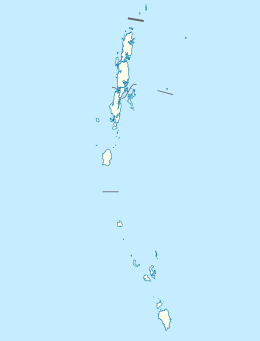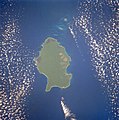Little Andaman
Native name: Gaubolambe | |
|---|---|
Location in the Andaman and Nicobar Islands and in the Bay of Bengal | |
| Geography | |
| Location | Bay of Bengal |
| Coordinates | 10°39′N 92°29′E / 10.65°N 92.49°E |
| Archipelago | Andaman Islands |
| Adjacent to | Indian Ocean |
| Area | 707 km2 (273 sq mi)[1] |
| Area rank | 1 |
| Length | 24 km (14.9 mi) |
| Width | 43 km (26.7 mi) |
| Coastline | 132 km (82 mi) |
| Highest elevation | 183 m (600 ft)[2] |
| Administration | |
| District | South Andaman |
| Island group | Andaman Islands |
| Island sub-group | Little Andaman Group |
| Tehsil | Little Andaman Tehsil |
| Largest settlement | Kwate-tu-Kwage (Hut Bay) |
| Demographics | |
| Population | 18,823 (2011) |
| Pop. density | 26.6/km2 (68.9/sq mi) |
| Ethnic groups | Onge, other Indians |
| Additional information | |
| Time zone | |
| PIN | 744207[3] |
| Telephone code | 031927[4] |
| ISO code | IN-AN-00[5] |
| Official website | www |
| Literacy | 84.4% |
| Avg. summer temperature | 30.2 °C (86.4 °F) |
| Avg. winter temperature | 23.0 °C (73.4 °F) |
| Sex ratio | 1.2♂/♀ |
| Census Code | 35.640.0009 |
| Official Languages | Hindi, English |
Little Andaman Island (Onge: Gaubolambe) is the fourth largest of the Andaman Islands of India with an area of 707 km2, lying at the southern end of the archipelago. It belongs to the South Andaman administrative district, part of the Indian union territory of Andaman and Nicobar Islands.[6] It lies 88 km (55 mi) south of Port Blair, the capital of Andaman and Nicobar Islands.
Geography
[edit]The island is in the Bay of Bengal and belongs to the Little Andaman Group, and is separated from Rutland Island in Great Andaman by the Duncan Passage. The Little Andaman Group is the counterpart of the Great Andaman island group.
The low-lying island has widespread rainforest and several rare species of marine turtle. Little Andaman Island has white sandy beaches and bewitching waterfalls. The Little Andaman Lighthouse (a.k.a. Richardson's Lighthouse) is located 14 km south by road from Hut Bay port and is situated on the Southern tip of Little Andaman Island.[7]
Climate
[edit]| Climate data for Little Andaman (Hut Bay) 1981–2010, extremes 1969–2012 | |||||||||||||
|---|---|---|---|---|---|---|---|---|---|---|---|---|---|
| Month | Jan | Feb | Mar | Apr | May | Jun | Jul | Aug | Sep | Oct | Nov | Dec | Year |
| Record high °C (°F) | 34.4 (93.9) |
35.2 (95.4) |
36.4 (97.5) |
36.4 (97.5) |
35.8 (96.4) |
36.3 (97.3) |
36.4 (97.5) |
35.6 (96.1) |
33.6 (92.5) |
34.8 (94.6) |
34.0 (93.2) |
34.4 (93.9) |
36.4 (97.5) |
| Mean daily maximum °C (°F) | 30.9 (87.6) |
31.5 (88.7) |
32.5 (90.5) |
33.2 (91.8) |
31.9 (89.4) |
30.9 (87.6) |
30.6 (87.1) |
30.3 (86.5) |
30.2 (86.4) |
30.7 (87.3) |
30.9 (87.6) |
30.7 (87.3) |
31.2 (88.2) |
| Mean daily minimum °C (°F) | 22.6 (72.7) |
21.3 (70.3) |
21.8 (71.2) |
23.0 (73.4) |
24.1 (75.4) |
24.9 (76.8) |
24.2 (75.6) |
24.5 (76.1) |
23.9 (75.0) |
23.1 (73.6) |
23.3 (73.9) |
23.3 (73.9) |
23.3 (73.9) |
| Record low °C (°F) | 14.1 (57.4) |
13.6 (56.5) |
16.3 (61.3) |
15.0 (59.0) |
18.2 (64.8) |
16.4 (61.5) |
17.8 (64.0) |
18.6 (65.5) |
15.8 (60.4) |
15.7 (60.3) |
16.6 (61.9) |
15.4 (59.7) |
13.6 (56.5) |
| Average rainfall mm (inches) | 32.7 (1.29) |
40.4 (1.59) |
50.8 (2.00) |
104.8 (4.13) |
376.7 (14.83) |
305.2 (12.02) |
330.7 (13.02) |
312.3 (12.30) |
439.1 (17.29) |
316.7 (12.47) |
270.9 (10.67) |
78.3 (3.08) |
2,658.6 (104.67) |
| Average rainy days | 1.8 | 1.6 | 2.5 | 5.2 | 15.8 | 14.5 | 14.4 | 15.9 | 16.8 | 14.3 | 11.6 | 4.5 | 118.9 |
| Average relative humidity (%) (at 17:30 IST) | 77 | 75 | 75 | 76 | 83 | 85 | 85 | 85 | 87 | 87 | 85 | 80 | 82 |
| Source: India Meteorological Department[8][9] | |||||||||||||
Administration
[edit]Administratively, Little Andaman Island is part of Little Andaman Tehsil.[10]
Demographics
[edit]The island is home to the indigenous Onge tribe, who call the island Egu Belong, and has been a tribal reserve since 1957. Settlers from Bengal and other places also live here. As per the census of 2011, the population was 18,823 in 4,093 households, spread among 18 villages. The main village of Kwate-tu-Kwage is located on Hut Bay.
Transportation
[edit]Hut Bay wharf, a deep water wharf that can be approached through a gap in the coral reef, on the east coast of the island is the entry point of Little Andaman Island. Daily boat services connect Hut Bay wharf with Port Blair in seven hours voyage. Additionally, there are a helicopter services by Pavan Hans Ltd. and a sea plane connection available between Port Blair and Hut Bay. The flight time by helicopter or sea plane is approximately 40 minutes.
| Airlines | Destinations |
|---|---|
| Jal Hans | Port Blair |
There is a road alongside the east coastal line.
Tourism
[edit]Little Andaman offers surfing, boating through the creeks, and visits to an elephant logging plantation. Butler Bay, 14 km from the Hut Bay Jetty, is a beach popular among tourists due to coral viewing, surfing and other marine activities. Tourist huts are available on the seashore itself flanked by the coconut plantation. Netaji Nagar Beach is 11 km from the Hut Bay jetty.[11]
Image gallery
[edit]-
Outline map of the Andaman Islands, with the location of Little Andaman highlighted (in red).
-
1990 Space Shuttle image of Little Andaman
See also
[edit]References
[edit]- ^ "Islandwise Area and Population - 2011 Census" (PDF). Government of Andaman.
- ^ Sailing Directions (Enroute), Pub. 173: India and the Bay of Bengal (PDF). Sailing Directions. United States National Geospatial-Intelligence Agency. 2017. p. 288.
- ^ "A&N Islands - Pincodes". 22 September 2016. Archived from the original on 23 March 2014. Retrieved 22 September 2016.
{{cite web}}: CS1 maint: bot: original URL status unknown (link) - ^ "STD Codes of Andaman and Nicobar". allcodesindia.in. Retrieved 23 September 2016.
- ^ Registration Plate Numbers added to ISO Code
- ^ "Village Code Directory: Andaman & Nicobar Islands" (PDF). Census of India. Retrieved 16 January 2011.
- ^ "Government of India, Directorate General of Lighthouses and Lightships". www.dgll.nic.in. Retrieved 18 October 2016.
- ^ "Station: Hut Bay Climatological Table 1981–2010" (PDF). Climatological Normals 1981–2010. India Meteorological Department. January 2015. pp. 329–330. Archived from the original (PDF) on 5 February 2020. Retrieved 8 February 2020.
- ^ "Extremes of Temperature & Rainfall for Indian Stations (Up to 2012)" (PDF). India Meteorological Department. December 2016. p. M1. Archived from the original (PDF) on 5 February 2020. Retrieved 8 February 2020.
- ^ "DEMOGRAPHIC – A&N ISLANDS" (PDF). andssw1.and.nic.in. Retrieved 23 September 2016.
- ^ guide
 Little Andaman travel guide from Wikivoyage
Little Andaman travel guide from Wikivoyage




